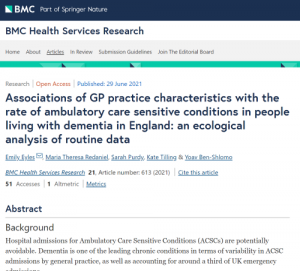GP practice characteristics could help predict hospital admissions for people with dementia
6 July 2021
The characteristics of GP surgeries could help predict both planned and unplanned hospital admissions for people with dementia, according to modelling work published by NIHR ARC West in BMC Health Services Research.
As the population ages, the number of people living with dementia is increasing. People with dementia are more likely to go to hospital and to do worse once they’re there. This study aimed to see if factors relating to care in GP practices influenced whether people with dementia go to hospital.
Using information up to March 2018, the researchers modelled hospital admissions from GP practices of people with dementia.
The factors they looked at were:
- Basic practice characteristics, such as how many female patients there were, and the number of patients seen by the practice
- Quality of care in the practice, measured by patient ratings and a quality score taken by the NHS
- Geographic characteristics: which region a practice is located, and whether it’s in a rural area
- Mental health budget: how much of the local area budget is spent on mental health
They looked at which factors could explain both types of admission for people with dementia, and also how much this varied by GP practice and NHS area.
They found that the GP practice factors predicted both types of admission almost equally, but that GP practices varied greatly in terms of admissions.
The mental health budget impacted admissions differently: for avoidable admissions, a larger mental health budget showed a decrease in those with dementia going to hospital, and the opposite was true for unavoidable ones.
This means that improving the mental health budget could help prevent avoidable visits to hospital for people with dementia.
More research should be undertaken on the differences we found between the NHS areas, particularly relating to the mental health budget. Further, examining what differences exist within practices could help improve care and reduce avoidable visits to hospital.
This work follows a systematic review looking at non-drug based interventions to keep people with dementia out of hospital. The review found the trialled interventions did not reduce either the rate that people with dementia were taken into hospital, the length of hospital stay or risk of death.
Further research is needed into reducing hospital admissions in people with dementia, to improve outcomes and quality of life.
Paper
